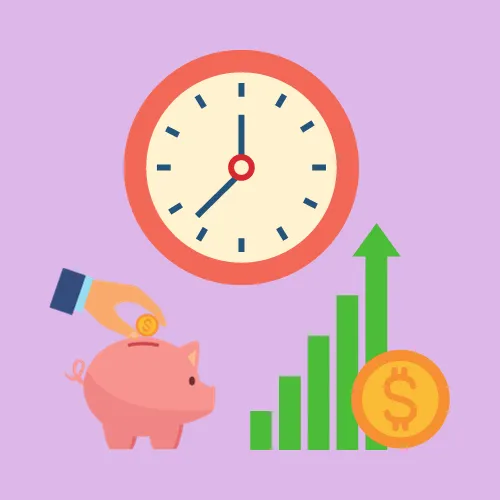Economics is a poorly-understood science, but that doesn't stop everybody and their mother from having a vociferous opinion. I'm no expert myself, but I have put forth a little effort to study the subject, so I would like to open the floor (so to speak) to discussion.

Image made in Canva
Time Preference
We would all prefer money now over money later. Money now is now. Later is not now, later is later. Does this observation seem too simplistic? Quite the contrary. Time preference is one of the key steps toward understanding the reason people make the economic choices they do, and why many make decisions which result in disaster. It also explains phenomena often dismissed as useless or destructive by critics of money and markets.
Would you prefer $1.00 now, or a promise of $1.00 next month? A dollar ain't what it used to be, but I'm sure almost everyone would take it now. How much more would I need to offer for you to consider waiting for that future dollar? Whatever that sum might be is a financial measure of your time preference.
The future is uncertain, and people dislike uncertainty. Now is concrete. Small children have trouble processing the idea of later at all, and now is all they understand. Patience must be learned. Delayed gratification is difficult. Threats of future punishment are vague. Not everyone seems to grow out of this phase.
Savings
When current goods are set aside for future consumption, present satisfaction is deferred for later enjoyment. This delayed gratification and surplus production is the foundation for all real wealth creation.
Our hunter-gatherer forebears learned to preserve meat between hunts. The early agricultural villages dug pits to store food between harvests. Durable goods for barter could be stockpiled, and the development of precious metal coins or other money-like media of exchange allowed wealth to be even more easily stored and transported while resolving the mutual coincidence of wants problem. Civilization would not be possible without savings.
Savings and surpluses also made systemic plunder by raiders and governments much more practical, but that's a matter for another post.
Investment
All human action includes an element of risk, but saving wealth allows a much greater margin of error for failure, and often a much greater opportunity for reward as well. Saved wealth, especially in the form of money, can be used to invest now for potential greater benefits later. When successfully used as a springboard to launch far greater long-term productive ventures, it can generate a greater reward for those who kicked off the process.
Investment might be formally established like when a startup company offered a stock purchase to generate revenue, or in the old west when a benefactor supplied a gold prospector with a grubstake, for example. In any case, a definite present risk is accepted in exchange for possible future reward. Another form of investment might include lending money to someone else...
Debt
Debt is fundamentally the inverse of investment. To borrow is to accept wealth now in exchange for giving future wealth in exchange. Those who lend money usually demand more future money in exchange because as already established. Money now is better than money later. Not only does the lender forego money now, they also forego all other possible uses of that money now while assuming the risk of non-payment entirely later. This is the root of modern interest rates on loans to account for these losses and risks even before including inflation and other factors outside these basic concepts.
Some religious traditions forbid the charging of interest, but that is outside the realm of economics. I leave that subject to theologians and the internal affairs of religious communities.
Many people will loudly claim interest is inherently exploitative. They see the higher cost of money later and completely ignore the advantages to the borrower getting money now. This habit of only seeing half of an exchange and trying to derive an entire economic principle from it is one of the greatest challenges to rational understanding.
Conclusions?
I am not a fan of debt. I don't advise it as an overall strategy. Most people are up to their ears in debt of one form or another, and find themselves falling ever further behind as they rely on credit to finance their lives. From 2009-2020, US household debt-to-equity rates hovered around 100%, and while the FRED chart shows a tapering to around 80% after COVID, I have reason to believe this gives an incomplete picture of our economic well-being.
As of this post, we are a year past this headline: US yield curve hits deepest inversion since 1981. People also tend to consider CPI as inflation, but one of (if not the most) powerful factors driving inflation is the money supply as can be seen in the M1 and M2 charts.
The national debt is also a completely different beast than the borrowing and lending in the market. A borrower usually pledges some form of surety, but governments operate differently. The politician reaps accolades for borrowing and spending, but the taxpayer's earnings are collateral on the loan. The politician gets money and power now while the productive economy is handed the bill later. This is not how wealth is built. This is how society becomes trapped in a warped parody of development which transfers wealth according to political connections instead of wise forecasting and economic activity. "But we owe it to ourselves" is nonsense.
All of this said, there are people who have the wits and will to leverage debt to be better market actors. If you're willing to accept those risks, go for it. Just do your due diligence and look before you leap. And don't you dare insist government pass any of your losses along to the taxpayer by assuming any debts you accrue.
Suggested reading: Economics in One Lesson by Henry Hazlitt
